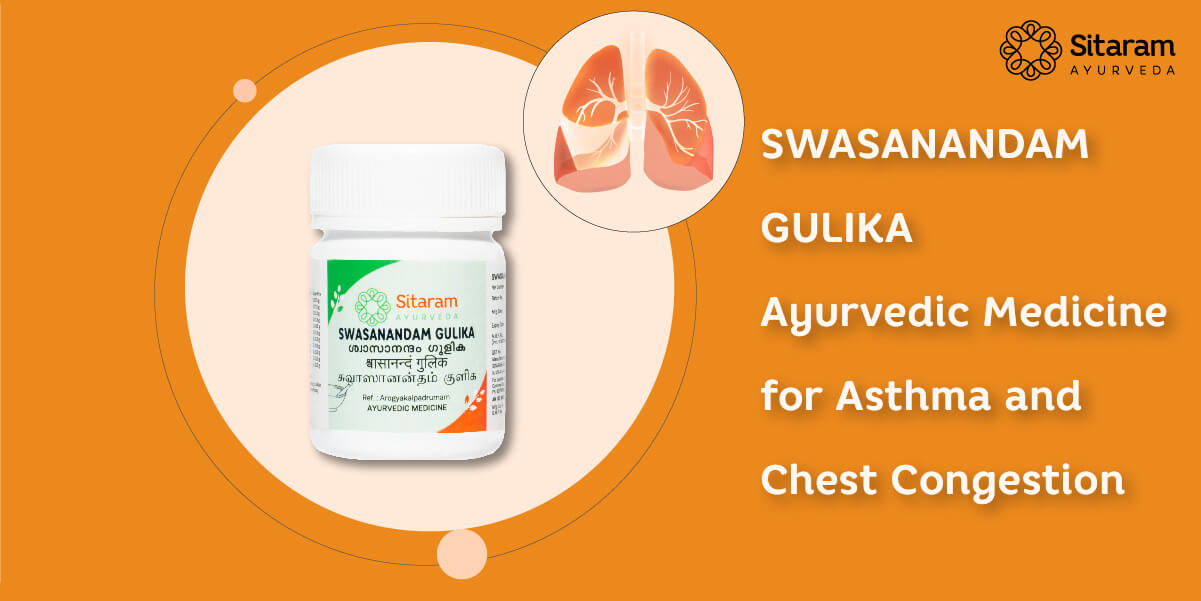Ayurvedic medicine for asthma and chest congestion – Swasanandam Gulika

The herbo-mineral formulation known as Swasanandam gulika strengthens the respiratory muscles and eases breathing. Lack of breath and wheezing are caused by the respiratory muscles spasming. The spasming muscles can be efficiently relaxed with Swasanandam gulika. “Swasa” means “breath” and “ananda” means “joy.” Swasanandam gulika strengthens and calms the respiratory system, bringing back the pleasure of effortless breathing. It is best in treatment for chest congestion brought on by a persistent cold or cough.
Benefits of Swasanandam Gulika
- When vitiated, the kapha dosha sits in the area of the lungs, causing heaviness, obstruction, and loss of function in the respiratory route. Swasanandam gulika effectively removes and expelling the troublesome kapha from this area.
- Laboured breathing is the outcome of weakened respiratory muscles. The muscles are strengthened by swasanandam gulika, which also eases breathing.
- Lack of breath and wheezing are caused by the respiratory muscles spasming. Swasanandam gulika can relax the respiratory muscles and helps to maintain a relaxed breathing pattern.
Ingredients
Swasanandam gulika is a combination of Trikatu (the group of digestives – Zingiber officinale, Piper longum, Piper nigrum), Jathiphala & Jathipatri (Myristica fragrans), Gandhakabhasma (purified and processed Sulphur), Karpoora (Cinammomum camphora), Tankana (Borax), Hingula (Cinnabar), Vatsanabha (Aconitum ferox) and Ardraka Swarasa (Zingiber officinale)
Dosage
- For Adults – One pill 2 to 3 times a day after food, with a suitable adjuvant.
- For Children – 1/2-1 pill 2 to 3 times a day after food, with a suitable adjuvant.
To be administered strictly under an ayurvedic physician’s supervision.
The uncomfortable feeling of quick, difficult, or uncomfortable breathing is known as breathlessness. Sometimes people report feeling breathless, short of breath, or puffy which is termed as dyspnoea medically. In dyspnoea, breathing may be hurtful and the chest may feel tight. However, it’s crucial to get medical help if you have trouble breathing because it can be a sign of a dangerous underlying condition. It may start off abruptly (acute) or gradually over time (chronic).
Breathlessness results from the body receiving less oxygen than it requires. So you try to breathe more quickly to try to get more oxygen-rich air into your lungs. The heart uses the blood to circulate oxygen throughout the body once it leaves the lungs.
Who are affected by shortness of breath?
When we exercise, all of us experience breathlessness, especially if we are overweight. However, uncomfortable breathlessness that appears suddenly or without warning may be caused by a dangerous underlying medical issue. Asthma typically affects young children, pneumonia can affect both the very young and the very old, smokers are more likely to develop lung and heart disease, and the elderly are more likely to experience heart failure. However, any age group can be affected by all of these disorders, and extreme breathlessness always requires medical attention.
Causes of breathlessness
- You may sound breathless and wheezy if you have asthma. A viral infection such as the common cold or an allergy; for example, hay fever.
- A severe chest illness called pneumonia makes you more breathless. You feel unwell, with a fever and a cough that produces greenish phlegm (sputum).
- Breathlessness that develops over a few days is possible with COVID-19.
- Breathlessness and coughing are symptoms of the long-term lung disorder chronic obstructive pulmonary disease (COPD). The airways narrow and swell with inflammation. A chest infection may cause it to abruptly worsen.
- Heart disease, such as heart failure, in which the heart is unable to pump adequately. The arteries feeding into the heart experience an increase in pressure because the heart fails to pump effectively. The body’s tissues begin to accumulate fluid as a result of the increasing pressure. Gravity causes the additional fluid to manifest as ankle swelling.
- Obesity and inactivity.
- Anaemia – Insufficient blood haemoglobin to transport oxygen to cells is known as anaemia. The result is exhaustion and shortness of breath.


 Sign In
Sign In Cart
Cart
Can I use swasa dam during 1st trimister of pregnancy
Hi
For an online consultation, please visit :
https://bit.ly/3vy1F4d
Our doctors would be happy to assist you better.
We in customer support are not in a position to give you medical advice. I hope you can understand.
Hi
For an online consultation, please visit :
https://bit.ly/3vy1F4d
Our doctors would be happy to assist you better.
We in customer support are not in a position to give you medical advice. I hope you can understand.